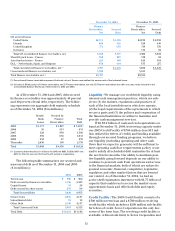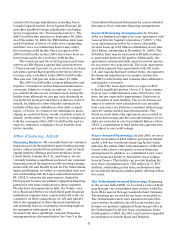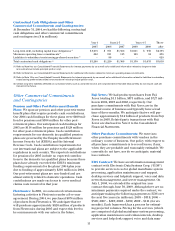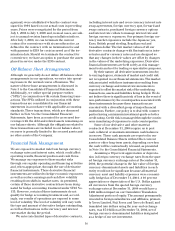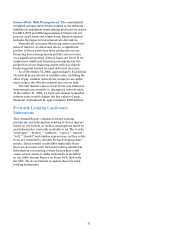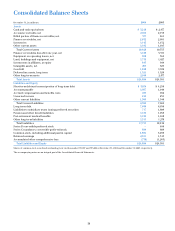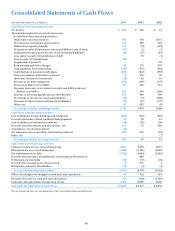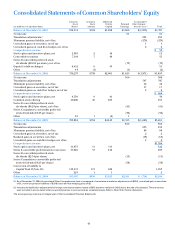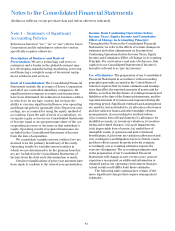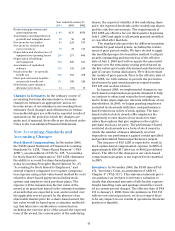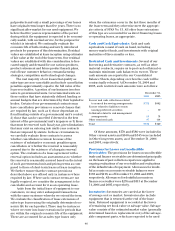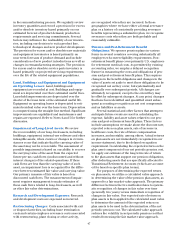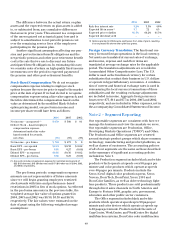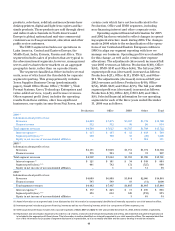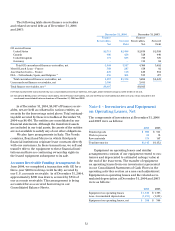Xerox 2004 Annual Report Download - page 44
Download and view the complete annual report
Please find page 44 of the 2004 Xerox annual report below. You can navigate through the pages in the report by either clicking on the pages listed below, or by using the keyword search tool below to find specific information within the annual report.
42
Income from Continuing Operations before
Income Taxes, Equity Income and Cumulative
Effect of Change in Accounting Principle:
Throughout the Notes to the Consolidated Financial
Statements, we refer to the effects of certain changes in
estimates and other adjustments on Income from
Continuing Operations before Income Taxes, Equity
Income and Cumulative Effect of Change in Accounting
Principle. For convenience and ease of reference, that
caption in our Consolidated Statements of Income is
hereafter referred to as “pre-tax income.”
Use of Estimates: The preparation of our Consolidated
Financial Statements in accordance with accounting
principles generally accepted in the United States of
America requires that we make estimates and assump-
tions that affect the reported amounts of assets and lia-
bilities, as well as the disclosure of contingent assets and
liabilities at the date of the financial statements, and the
reported amounts of revenues and expenses during the
reporting period. Significant estimates and assumptions
are used for, but not limited to: (i) allocation of revenues
and fair values in leases and other multiple element
arrangements; (ii) accounting for residual values;
(iii) economic lives of leased assets; (iv) allowance for
doubtful accounts; (v) inventory valuation; (vi) restruc-
turing and related charges; (vii) asset impairments;
(viii) depreciable lives of assets; (ix) useful lives of
intangible assets; (x) pension and post-retirement
benefitplans; (xi) income tax valuation allowances and
(xii) contingency and litigation reserves. Future events
and their effects cannot be predicted with certainty;
accordingly, our accounting estimates require the
exercise of judgment. The accounting estimates used
in the preparation of our Consolidated Financial
Statements will change as new events occur, as more
experience is acquired, as additional information is
obtained and as our operating environment changes.
Actual results could differ from those estimates.
The following table summarizes certain of the
more significant charges that require management
estimates:
Note 1 – Summary of Significant
Accounting Policies
References herein to “we,” “us” or “our” refer to Xerox
Corporation and its subsidiaries unless the context
specifically requires otherwise.
Description of Business and Basis of
Presentation: We are a technology and services
enterprise and a leader in the global document mar-
ket, developing, manufacturing, marketing, servicing
and financing a complete range of document equip-
ment, solutions and services.
Basis of Consolidation: The Consolidated Financial
Statements include the accounts of XeroxCorporation
and all of our controlled subsidiary companies. All
significant intercompany accounts and transactions
have been eliminated. Investments in business entities
in which we do not have control, but we have the
ability to exercise significant influence over operating
and financial policies (generally 20 to 50 percent own-
ership), are accounted for using the equity method of
accounting. Upon the sale of stock of a subsidiary, we
recognize a gain or loss in our Consolidated Statements
of Income equal to our proportionate share of the cor-
responding increase or decrease in that subsidiary’s
equity. Operating results of acquired businesses are
included in the Consolidated Statements of Income
from the date of acquisition.
Weconsolidate variable interest entities if we are
deemed to be the primary beneficiary of the entity.
Operating results for variable interest entities in
which we are determined to be the primary benefici-
ary are included in the Consolidated Statements of
Income from the date such determination is made.
Certain reclassifications of prior year amounts have
been made to conform to the current year presentation.
Notes to the Consolidated Financial Statements
(Dollars in millions, except per-share data and unless otherwise indicated)


